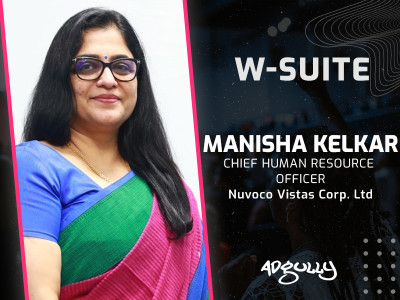"Time now to break down the infuriating patriarchal beliefs of gender"
We, at Adgully, have always saluted and honoured women managers and leaders across diverse fields. W-SUITE is a special initiative from Adgully that has been turning the spotlight on some of the most remarkable women achievers in M&E, Advertising & Marketing, PR & Communication industry. In the refurbished series, we seek to find out how women leaders have been managing their teams and work as well as how they have been navigating through the toughest and most challenging times brought about by the global pandemic.
Sunita Quadros is Senior Vice President at ET Edge (The Times of India Group)/ Worldwide Media. With two decades of industry leadership and expertise, Quadros is credited with significantly shaping the Economic Times ET Edge into a leading global exchange platform for business and economic intellect, for the development of long-term growth and sustainability.
In conversation with Adgully, Sunita Quadros speaks about women shifting gears in a patriarchal society, gender equality in the workplace, work from home operating model, lessons that she learned as a woman leader and more.
How do you think the role and scope of women leaders has widened in the post-pandemic world?
I believe that the advancement of women into leadership roles began even before the pandemic, and that there have been small but important shifts in patriarchal attitudes since then. The shift in attitudes may seem gradual, yet the crisis has both highlighted and confirmed that women play an important role in shaping business and economies. If one looks back over the last two decades, gender diversity in the workplace has been a top priority for corporations, economies, and international organisations, and although not in large numbers, women were on an equal footing with their male counterparts in conventional male-dominated roles. If we look around us at the key portfolios that are held by women, ranging from key ministerial positions to the recent announcement of a woman leader as the SEBI Chief, just demonstrates that women have taken over key roles.
I agree that there still much work is required for gender equality in the workplace and around the world. To summarise, it is now time to break down the infuriating patriarchal beliefs of gender, leadership, and its concepts – for a brighter future.
The rapid transition to digital, an uncertain economic landscape, charting unknown waters, working from home – how have you been navigating during the COVID-19 times? How are you maintaining work-life balance in the new normal?
We are live B2B event curators. Our key offerings range from on-ground conferences, summits, conclaves, smaller business meetings, and one-on-one talks. Keeping in view our dependency on physical interactions, we anticipated the pandemic to bring our business to a complete halt. We looked at severe pandemics in the past and knew quite early that COVID-19 was here to stay with us for at least a couple of years. We knew that we needed to quickly adapt and change our strategy for the next few years. We had two key issues to handle – the most important being our business model and then of course, our work from home operating model. All team leaders got together and moved our event business to the virtual world, we also invested in digitisation, collaboration, and social enterprise tools and this ensured we were able to easily transition to the remote work system within a month.
I have to state that this transition would not have been possible without the focus and drive of the management as well as the core team that drove this transition.
It would be a lie if I said we managed work-life balance. Maintaining any form of balance was virtually impossible. We had to work vigorously around strict timelines, change course based on the situation, adhere to our goals and ensure we maintain client experience. However, while the task was daunting, we all enjoyed the journey. The last two years have just helped boost our belief and our ability to sustain against all odds.
Multiple studies have shown how women leaders performed better during the COVID-19 crisis. According to you, what makes women the best in crisis management?
Simply put, women leaders are more empathic than their male counterparts. Realistic conviction combined with practicality and sensitivity in decision-making resulted in good crisis response techniques, in my opinion. Also, women, especially Indian women, are multi-taskers – they are moms, working women, spouses, daughters, professional women, cooks, and housekeepers all rolled into one. This, in my opinion, aids women in making more focused, unambiguous, and inclusive decisions, which leads to better outcomes.
What are the five most effective lessons that you have learned as a woman leader?
- To craft clear goals
- Operate with a purpose
- To create a blend of traditional processes, technology and digitization
- Create business strategies, based on sustainability
- Cultivate talent and reskill
Gender sensitivity and inclusion in the new normal – how can organisations effectively encourage and groom women leaders in challenging times?
Shifting organisational culture toward greater equity, diversity, and inclusion is becoming increasingly important. Women should be able to recognise their own special abilities and grasp what they bring to the workplace. Organisations should adopt a broader view of the systematic approach to retaining and developing women leaders to create a gender-inclusive work environment. Corporates must realise that there is no such thing as a one-size-fits-all approach to recruiting, retention, and development. HR departments must have interventions in place for developing and inspiring women leaders on an individual level, especially as we adapt to the complexities of hybrid working. This is not only a good organisational technique, but it also helps to achieve the proper gender balance.
















Share
Facebook
YouTube
Tweet
Twitter
LinkedIn